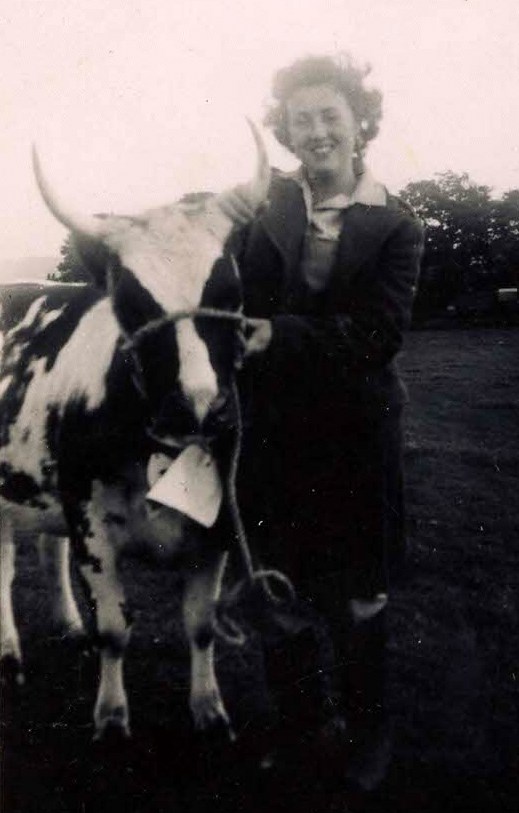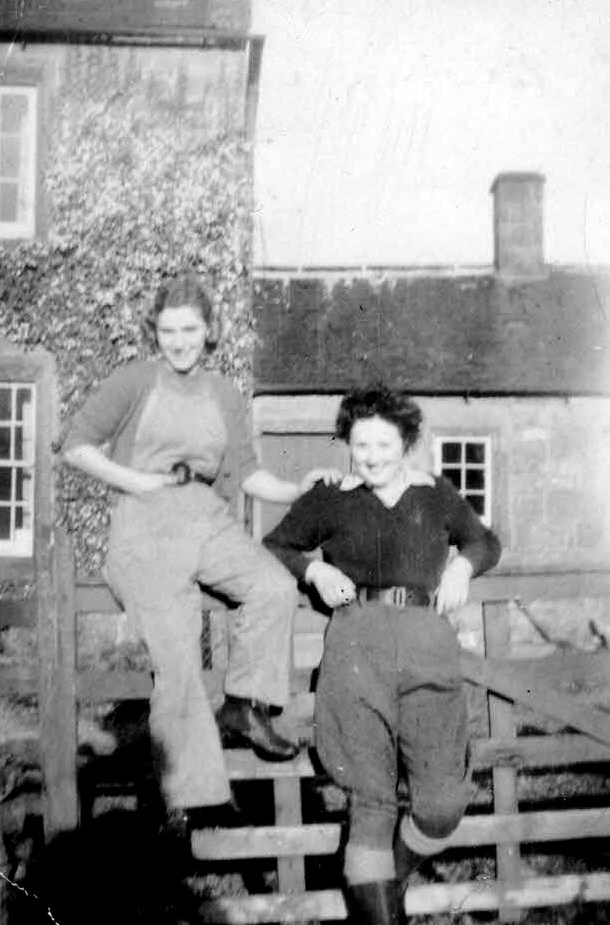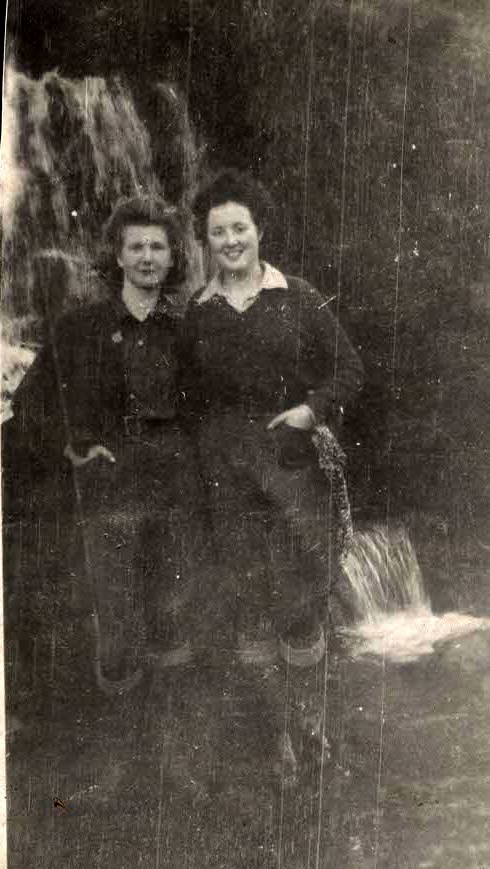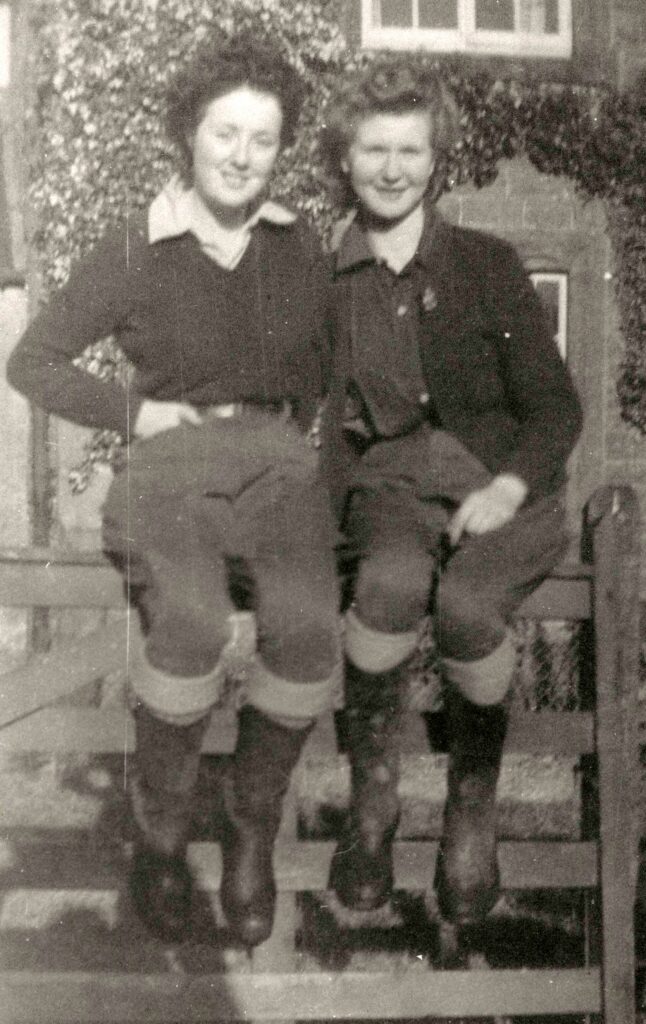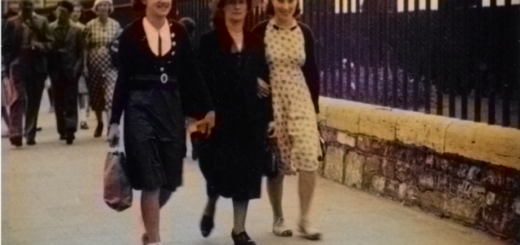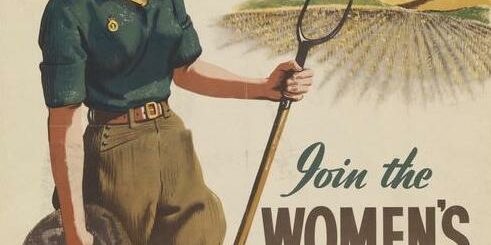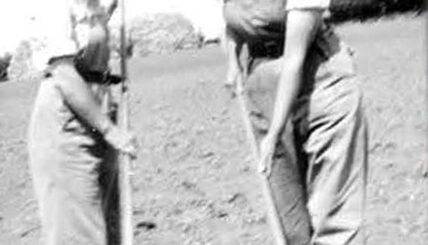Mollie Wake Rogers (née Mitford)
The first week as a Land Girl
“November 28th, 1944 – how well I remember that day! I had joined the Women’s Land Army which to me, at that time, was the most exciting thing I’d ever done in my life.
I’d always had a yen to work among animals (despite my fear of cows!) and to work out of doors (little did I realise what hard work it would entail), and so there I was all set to go – boarded a train at Newcastle upon Tyne Central Station which was to take me to Carlisle from where I had next to board a bus to an unknown village (to me) called Ireby, south west of Carlisle.
On arrival at Carlisle I made my way to the bus station only to discover that I had apparently been supplied with the wrong bus times and the last bus had already left. Panic set in – what could I do?
I also had a mental vision of an irate farmer when he discovered I wasn’t on the bus he was expecting me to be on. However, as I had previously been evacuated to Carlisle I straightaway made my way to friends whom I knew would accommodate me for the night.
Next morning found me on my way to Ireby and feeling a little apprehensive as to what might be in store for me. I remember the bus conductor asking me where I was bound for and on being told he commented that it wasn’t right for landgirls to be sent to such off the beaten track farms – imagine how that made me worry and wonder.
Eventually I did arrive at my destination and found that I would be working alongside another landgirl – Dora came from Bolton in Lancashire – a very slim girl but yet amazingly strong. Another young girl worked in the house helping with the chores and meals and we all became good friends.
In the afternoon of my first day I was sent out to help Dora bring in some cows – I donned overalls and gumboots – these were absolutely essential as fields were like a quagmire, and I kept getting stuck and losing the gumboots. However there I was shoo-ing the cows in and trying not to appear too frightened of them.
The job I was given the following morning, and in fact every morning for the rest of that first week, was mucking out a large cow byre.
To lift just the empty barrow seemed an effort let alone what it was like when piled up with manure and as several trips had to be made back and forth to the muck heap, I was completely exhausted by the time the task was completed.
The stalls then had to be swilled out and my arms felt as if there was no strength in them whatsoever by this time. There was a cowman employed so I didn’t have to be involved in the milking or foddering up of the animals.
Well at the end of that first week I was ready to give up! My hands were in a bad way with broken blisters and I ached in every part of me (why hadn’t I just stuck to office work?). I hardly seemed to get off to sleep when it was time to get up – all I heard was cows moo-ing and hens clucking at some unearthly hour.
However, eventually I was given another job one which I enjoyed very much, and that was to look after some ‘dry’ cows and heifers at another farm up on the fell. As no water was laid on in the byres there, the cows had to be let out to find their way across fields to water troughs and while they were out I cleaned out the byres (several small ones), laid down fresh straw and filled the racks with hay, ready for the animals when they were brought in late afternoon.
That task could be exasperating as working single-handed it was hard work getting cows back into their stalls and fastening them up. There again coaxing heifers back into pens proved to be a very exhausting task. I remember one morning while I was there busily engaged in my chores and singing away for all I was worth, a man appeared as it seemed from nowhere and asked if I’d seen any stray sheep around – it transpired that he was from another fell farm.
He saw what I was doing and remarked that he had had all that work done by 4.30 that morning! “Early to bed and early to rise” must have been his motto, although I think many of the old type farmers were like that.
After the first week
And so the weeks went by – in between looking after animals there were always plenty of other jobs to be done in the fields, for instance muck spreading, which was actually a favourite job of mine as I always seemed to experience a great feeling of satisfaction when I looked back over a field of scattered manure – where before had stood row after row of piles of the stuff.
At other times I helped Dora feed the calves. We had to line up buckets of calf gruel outside the pens, then one of us would open up the pens and rush back to help the other hold onto the buckets as the calves came out in such a big rush.
We were called on to do so many different jobs – I recall one Sunday when we had to cycle to the nearest railway station which was some seven miles away to bring back cows which had been in cattle trucks overnight. The return journey seemed endless and very tiring, and cows can be so stupid.
Another time we were called on to go and round up one of the mares and her foal as they had somehow or other managed to escape – out came our bikes and off we went searching. No time to be bored!
Being at Snittlegarth was fun in many respects – we worked hard, long, hours, but the good times compensated for the weariness we felt after a day spent looking after animals or working out in the fields. Spring especially was lovely, and after we’d finished work we’d either go walking or cycling into the village itself to spend our sweet coupons (if we had any left), or go visiting in some of the pretty villages nearby.
Social life
Dances were held from time to time in the tiny village halls – they were then filled to capacity with everyone having a right good evening out. What did it matter if it meant not getting home till maybe one or two am (depending on how far we had to cycle)? We never minded the long rides home as there was always a crowd of us and we always had plenty to laugh and sing about.
And then there were the Women’s Institute meetings and social events to attend, not forgetting the Young Farmers’ Club, and we always attended church each Sunday. Sometimes we were late in getting there depending on what time we’d finished work. We worked erratic hours to say the least!
Moving onto pastures new
After six months the other landgirl, Barbara, the girl who worked indoors, and I decided we’d had enough and it was time to move on. Dora and I worked long hours and had no time off, except on Sundays (and not always then!) when you were supposed to do only what was absolutely necessary, ie attend to the animals.
We were entitled to a half-day off per week, but had to save these up if we wanted to go home for a long weekend. Sometimes we’d be working as late as 10 pm if a load of straw arrived and needed to be unloaded and there was no extra pay for this. Landgirls were paid £3 per week, thirty shillings of which went to the farmer for your keep.
We went our separate ways – me to a dairy farm situated just outside of Carlisle. This was a very modern farm with a milking parlour installed – the first I had ever seen. I had to be up and out in the yard every morning for 6.05 am. I didn’t mind that in the least but oh! the snobbish people I worked for – I had my meals with them but after the evening meal was expected to stay in my own room. By the end of a week I’d decided that I’d had enough of that kind of treatment and duly set about asking for a transfer.
Needless to say the WLA authorities were none too pleased with me, however, I was granted a transfer and sent to a dairy farm at Gilsland which is on the borders of Cumbria and Northumberland and only 40 miles from my home in Newcastle. there I was to spend the next twelve months.
I took to the people with whom I was to stay from the moment we met and to this day I am still in contact with the widow of the man I worked for. I lived in with the chap who managed the farm, his wife and wee daughter, and there was also a hired lad living in who had arrived there just a couple of weeks before me. The man who owned the farm lived in a large house next door and we saw him most mornings when he came to inspect the milk records.
Hard work and long hours
Work started at 6.30 am and ended at 6 00 pm except at haytime and harvest time. Twenty pedigree Ayrshire cows had to be milked and I was shown how to set up the milking machines, keep an eye on the cows being milked and see to the weighing and recording of the milk from each cow. After each milking all the equipment had to be washed – first rinsed out cold water, then washed in hot, and again rinsed in cold, then sterilised.
During the winter months I hated the rinsing out in cold water as my fingers used to stick to the churns! The cooler and sieves had to be kept scrupulously clean and woe betide you if they weren’t, as once a month the man from the Milk Marketing Board came to check up on records and cleanliness.
The byres had to be kept spotlessly clean, walls scrubbed and swilled down, even the cows’ tails were washed and brushed (their udders were wiped each morning and evening prior to milking). The yard outside the byre, which was cobbled, had to be swept daily and kept free of weeds and oh! did those weeds grow fast.
In between milking times I did all sorts of field work depending on the seasons. Stones had to be gathered, thistles cut, mole hills knocked down, muck spread, lime spread, there was mangolds and turnips to be gathered, kale to be cut, turnips and mangolds to be chopped for fodder, and of course haytime and harvesting.
Haytime and harvesting were extremely busy times as when the weather was good it was all go. It was hot, dusty work and we were always glad of the breaks at 10am and 3pm when the farmer’s wife brought us tea and goodies to eat and were we always hungry! It was good to rest awhile with backs against the haystacks.
I have happy memories of rides back to the farm sitting on top of a load of hay. Then the hard work started again as the hay had to be piked into the barn. I used to be on the receiving end, forking the hay back into the barn, spreading it around trying to keep a fairly level surface, and all the time getting higher and higher until I was almost bumping the roof and it was certainly hot up there.
In haytime and harvest we worked long hours, but usually no later than 8 pm and got paid overtime. We had to work weekends also if the weather was good. After supper sometimes I’d cycle about 3 miles to another farm where a friend of mine worked to help with their haymaking – they kept odd hours and we’d work for as long as we could see as there used to be double summertime during the war.
I enjoyed working among the animals especially the calves. Unfortunately the bull calves were only kept for a very short time after they were born and then taken away for slaughter which made me sad. There again when a cow was too sick to recover or got too old, again I was always upset.
I remember old Hazel (all our cows had names), she had bad feet, could hardly walk, and the wagon came for her one morning. I remember seeing a newly born calf (what a wonderful sight) and then marvelling at it struggling to get up on all fours. The calves were soon taken away from their mothers and put into pens, then I had the job of teaching them to drink out of a bucket – great fun.
Blossom, the award-winning Shire Horse
We had a shire horse called Blossom but it was the hired lad’s job to look after her and work her – I only once attempted to work her but was so nervous that I in turn made the mare nervous, and I gave it up as a bad job.
I well remember pig-killing day – can still remember to this day the awful squealing of the pig when it was led away – and for a long time afterwards. I couldn’t face bacon, let alone the black puddings and sausages which I’d helped the farmer’s wife to make! I never had much to do with the pigs except when they were small and I looked after them then, but as they grew big and boisterous, the farmer took me off that job.
The day arrived when the annual agricultural show was held and of course some of our stock were entered – Blossom, the Clydesdale, some sheep, calves and a heifer named Barbara whom I had to ‘train’ to walk properly for a couple of weeks beforehand.
Most days I spent a little time leading Barbara by a halter along the lanes. At first she was inclined to be rather frisky but after a while settled down to a sedate walk. She got to be rather a pet and used to run across the fields to me when I called her name. Of course she knew I always had some ‘nuts’ to feed to her.
On the morning of the show we were up and out in the yard by 5.30 am to dress up the animals. Blossom looked resplendent with her “feathers” brushed and talcumed, her coat gleaming with constant brushing, her tail washed and beribboned as was her mane and the harness and trappings were a sight to behold.
Barbara seemed to know something was afoot and didn’t want to behave. I had visions of her careering around the show field uncontrollably. However, we managed somehow to give her a shampoo and dry her down, then she was brushed and brushed, and butter rubbed over her hooves to make them shine. Show day was great event with farmers and their families and livestock arriving from the surrounding areas and from “out by” as we called the farms on the fells.
At long last the judging commenced and we were highly delighted when Blossom and Barbara won 1sts in their respective classes. It was a long day but nevertheless we were not too tired to attend the Show Dance in the evening – some of the farmers could dance as lightly as feathers even in their working boots!
The winter months were hard going up in that part of the country. The cold was so intense and it was hard to get out of a warm bed each morning but once in the byre you could get as warm as toast among the cows until you had to make the journey out to the dairy.
When Spring arrived everything seemed great again. Plenty of spring-cleaning to be done as all the walls of the byres and pens had to be whitewashed (this was done by making use of a stirrup pump), doors, gates, as well as carts, had to be painted, everywhere in fact had to be spruced up – never a dull moment.
Working with Prisoners of War
It was in the Spring of 1946 that the German POW’s arrived – 17 of them, all high ranking officers, transported by bus every day from Featherstone Camp near Haltwhistle, to do field work. I saw very little of them, except when they arrived and left, apart from the cook who made them a mid-day meal, and he was always coming to the dairy for water. He told me a lot about his family as well as how and where he’d been captured, and was of course longing to return to his own country. He had made lots of puppets from wood and material which he’d managed to obtain somehow and apparently gave shows at the camp – one day he brought them all to the farm and gave us a demonstration.
I remember that the prisoners were very fond of flowers and they asked the owner of the farm for permission to pick some from his huge garden to take back to one of their comrades at the camp as it was his birthday. He gave his consent and as he had 40 varieties of daffodils alone to chose from they were able to pick quite a large bunch.
I met some grand old characters – one was Jim who had in his day been the village blacksmith – he used to go rabbiting and would always get one for me to take home on my weekend off (this was every third weekend) and then there was Old Jim the gardener who, when he wasn’t busy gardening, would help me cut up mangolds and turnips, or sortout small potatoes for the pigs.
We sometimes had extra help for hoeing but mostly it was just Jimmy, the hired lad, and I working together. We used to sing all the songs going at the time but a favourite was “Don’t Fence Me In” and every time I hear it nowadays I think of those happy, carefree, days so many years ago.
VJ Day
I remember well the day Victory over Japan was announced. I had been sent into Brampton (7 miles away) by bus to collect something or other from the home of an uncle of the farmer’s wife only to discover when it came time to return that the buses had stopped running because of the celebrations.
I had to borrow a bicycle and accompanied by Uncle George set off on the seven miles back to the farm. From Brampton to Dilsland, via Lanercost, is all uphill so it was a case of walking and pushing the bikes, however once up on the tops it was plain sailing and from up there was the most wonderful view of the bonfires which had been lit all around the countryside to celebrate VJ night.
Uncle George had worked with archaeologists all along that road back to Gilsland, unearthing remains of the Roman Wall of which there is a great deal in that area, not to mention the remains of a Roman Camp, so I had a history lesson that night. Once back at the farm it was all rush getting ready to go to a dance in the village which had been hurriedly arranged for the celebrations – I don’t know where I found the energy from but did and still got up at 6.30 next morning!
The evenings
After a hard day’s work most evenings were spent doing mending, knitting, writing lots of letters which I always enjoyed, and listening to the wireless (as it was called in those days), or just talking. However, on Saturday evenings a dance was held in the village hall – we did the usual modern dances but also learnt how to do “Three Drops of Brandy”, “Gay Gordons”, “Dashing White Sergeant”, “Cumberland Reel” – all very energetic dances and a lot of fun to learn!
Some evenings my boss and his wife entertained and friends would be invited to supper which took place between 7.00-7.30 pm. Everyone always had plenty to talk about – no television in those days. One special evening that I do recall was when a “Miss Agriculture” Competition was held in the WLA Hostel in Brampton, followed by a dance. I was fortunate to be one of the six finalists but that was as far as I got – the lucky winner was to represent the area and have the honour of marching in a parade which was to take place in London as part of the victory celebrations.
As I mentioned previously one of my favourite jobs was scaling muck, and hoeing came a close second. But also I enjoyed very much haytime and harvesting. Again you experienced a great satisfaction of having done a good job. I liked stocking corn despite getting covered with harvest flies!
Harvesting was quite exciting as when the crop was being cut, the rabbits who were living and feeding there, moved nearer to the centre, and when the last little patch came to be cut, out would dash the rabbits – poor things! Some of the men were so quick they could fell a rabbit with a blow on the back of its neck. I think my least favourite jobs were cutting thistles as they were endless, and seemed to spring up again overnight, and making sileage which I did not enjoy at all. Still it had to be done.
One unpleasant experience I had while working on the first farm I was sent to was catching cattle ringworm. The other landgirl and I had to treat cattle who were infected with ringworm, and, consequently, we caught it and had to go for ultra-violet ray treatment which at first had good effects, but then after a month back came the ringworm twice as bad. Eventually the ringworm did heal and disappear but it did take a long long time. We used to go to dances wearing long sleeved dresses or blouses to cover up the unsightly “rings” from everyone.
Eventually came the time when I decided I would like to return to ‘civvy’ street. I had been given the opportunity to take up my old job in a Solicitors’ office and this I decided to do and so in June 1946 I left the farm where I’d spent so many happy months – I had made a lot of friends, the met a great many new people, and had had the experience of working or/land which had given me a great deal of satisfaction. I had enjoyed doing my little bit towards the war effort and the memories of my days in the Women’s Land Army will stay with me forever.”
General Information
First Name(s): Mollie Wake
Unmarried Surname: Mitford
Married Surname: Rogers
Date of Birth: 1925
Place of Birth: Heaton, Newcastle upon Tyne
Date Joined WLA: 26.8.44
Date Left WLA: 14.6.46
WLA number: 149554
Previous occupation: Shorthand typist
Reasons for joining: To do my bit, liked animals, knew someone who was already in the WLA.
Reactions of local people: All positive
Reasons for leaving: War ended and I was offered by old job back.
Employment
Worked for Richard Green and Stanly Walten in Ireby, Cumbria on Snittle Garth and The Hill farms.
Work liked most and last: Dairy work – spreading muck. Did not like making silage.
Accommodation
Live in private billet in Snittlegarth and later The Hill.
Life after the war
Did you return to pre-war occupation?: Yes, continued work as a shorthand typist
How did work in the WLA effect your life? Freedom/independence, appreciation and a love of the countryside.
Contributor Information
Name: Mollie Rogers
